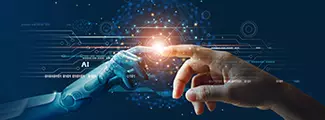The relentless march of technology has ushered in an era where artificial intelligence (AI) is not just a buzzword but a transformative force shaping the landscape of work. Artificial Intelligence (AI) is no longer a concept we read about in science fiction novels. It is here and changing the world as we know it. The rise of AI is rapidly altering the job landscape. With AI-powered recruiting and the integration of AI in the workplace, job seekers need to understand automation technology and the impact of artificial intelligence on employment.
What is artificial intelligence (AI)?

Artificial intelligence refers to machines or systems that mimic cognitive functions typically associated with humans, such as learning, reasoning, problem-solving, and decision-making. AI systems can analyze vast amounts of data at incredible speeds, uncovering patterns and insights that would take humans much longer to discern. As we explore the intricacies of AI, it becomes imperative to ponder how artificial intelligence will change the future, influencing the way we work, make decisions, and interact with evolving technologies.
The Impact of Artificial Intelligence on the Future of Work
Integrating AI into the hiring process has made it more efficient and streamlined. With the help of AI, companies can sift through thousands of resumes in seconds and identify the most qualified candidates. They can also use AI to conduct initial screenings, assessments, and interviews. This means job seekers must ensure that their resumes and online profiles are optimized for AI screening. Including relevant keywords and skills can help job seekers get past the initial screening and into the hands of a human recruiter. Here are some of the ways on how artificial intelligence will change the future.
•Increased Competition
The proliferation of AI in the workplace has given rise to a more competitive job market. With automated processes streamlining various aspects of recruitment, the sheer volume of applicants for any given position has increased. Job seekers now find themselves vying against not just fellow humans but also algorithms, creating a need for a strategic approach in standing out.
•Resume Screening

Gone are the days when a human recruiter would meticulously review every resume. Many companies now use AI to screen resumes and shortlist candidates based on specific keywords or criteria. This means that your resume needs to be optimized for AI screening by including relevant keywords and highlighting your skills and experience, applicable to desired positions.
•Video Interviews
With the rise of remote work, video interviews have become more common. AI-powered tools can analyze your facial expressions, tone, and body language to assess your suitability for the role. To succeed in a video interview, you must ensure that you come across as confident, enthusiastic, and professional.
•Chatbots

Some companies use chatbots to conduct initial screening interviews or answer candidate queries. To impress the chatbot, you need to ensure that your responses are clear, concise, and relevant.
Today, many companies use AI in their hiring process to speed up the recruitment process, reduce bias, and provide a better candidate experience. AI algorithms can analyze resumes and cover letters to identify the best candidates for a job opening. AI can also analyze a candidate's social media presence to understand their interests and personality better. Here are some tips to help you stand out in an AI-powered job market.
However, the increasing use of AI in the recruitment process also raises concerns about bias and discrimination. AI algorithms are only as good as the data they're trained on. If the data is biased, the algorithm will be biased as well. This could lead to discrimination against certain groups of people, such as minorities or people with disabilities.
-Use keywords relevant to the job description in your resume and application.
-Keep your resume simple and easy to read, with clear headings and bullet points.
-Use a professional email address and ensure that your social media profiles are updated and portray a positive image.
-Practice interview skills, including speaking clearly and concisely, and being comfortable with video interviews.
•Career Pivots
The evolving nature of work driven by AI also presents opportunities for career pivots. Job seekers can explore emerging fields where human skills complement AI capabilities, creating a synergy that enhances overall productivity. Adaptability and a willingness to embrace change become valuable assets in this dynamic job market.
•Upskill And Reskill
Recognizing the shift in demand for skills, job seekers must invest in continuous learning. Upskilling and reskilling are not just buzzwords but practical necessities in a world where technological advancements are the norm. The ability to adapt and acquire new skills positions individuals for success in a job market shaped by AI.
AI and Jobs of the Future
Artificial Intelligence is set to transform today's jobs. While some roles may be eliminated due to automation, many new ones that require AI and machine learning skills will be created. AI can augment human intelligence, allowing people to focus on more complex and creative tasks while leaving repetitive and mundane tasks to machines. Understanding the impact of artificial intelligence on jobs and emerging trends is crucial for job seekers looking to future-proof their careers. Here are some roles that we can expect to take precedence.
•Data Analysts and Scientists
The increasing reliance on data-driven decision-making has led to a surge in demand for data analysts and scientists. These professionals play a crucial role in interpreting complex datasets, extracting actionable insights, and guiding strategic business decisions.
•Augmented and Virtual Reality Specialists

The integration of augmented reality (AR) and virtual reality (VR) in various industries opens up avenues for specialists in these fields. From enhancing training programs to creating immersive customer experiences, professionals who can navigate the realms of AR and VR are well-positioned for the jobs of the future.
•Ethical AI Specialists
As AI systems become more pervasive, the need for ethical considerations in their development and deployment has grown. Ethical AI specialists ensure that algorithms adhere to principles of fairness, accountability, and transparency. This role reflects a societal awareness of the ethical implications associated with AI.
•New Job Opportunities

AI not only transforms existing roles but also creates entirely new job opportunities. From AI trainers and explainability specialists to AI ethicists, the evolving landscape of work demands a diverse set of skills and expertise. Understanding concepts like "what is generative AI" becomes pivotal for individuals aiming to navigate and contribute to this dynamic field. Generative AI, with its ability to create content and generate new information, exemplifies the innovative possibilities that arise within the ever-expanding spectrum of AI applications.
•Transformation of Existing Roles
Roles across various industries undergo transformation due to the integration of AI. For instance, customer service representatives may collaborate with AI chatbots to provide more efficient and personalized support. Understanding how AI augments and transforms traditional roles is essential for job seekers seeking to align themselves with industry trends.
•Collaboration between Humans and Machines

Contrary to the fear of AI replacing humans, the future of work is likely to involve a collaborative relationship between humans and machines. Job seekers with the ability to work seamlessly alongside AI, leveraging its strengths while contributing uniquely human skills, will find themselves in high demand.
Conclusion

As job seekers navigate the intricate landscape shaped by AI, the key lies in adaptability, continuous learning, and a strategic approach to the job search.
HGS USA is at the forefront of the business process outsourcing industry, exemplifying a commitment to innovation and efficiency. We recognize the significance of understanding robotic process automation (RPA) within our organization. Leveraging cutting-edge technologies like RPA allows us to streamline operations, enhancing customer experiences. This strategic integration of technology plays a pivotal role in automating routine tasks, enabling our skilled professionals in call center jobs in the USA to redirect their efforts toward more complex and value-driven aspects of customer service. As we continue to evolve in tandem with technological advancements, ensuring a seamless blend of human expertise and robotic process automation remains integral to delivering top-notch customer service experiences.
As the job market evolves, so must the approach of those seeking employment – with resilience, foresight, and a commitment to lifelong learning. The future of work is shaped by AI, and job seekers now hold the reins to shape their own destinies in this dynamic landscape.
 US
US Canada
Canada Colombia
Colombia India
India Jamaica
Jamaica Philippines
Philippines UK
UK SA
SA
